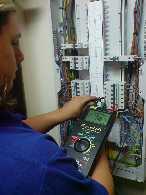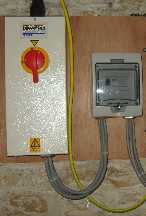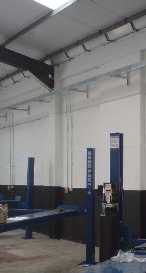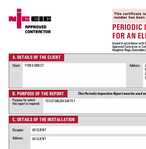NICEIC approved Electrical testing and House rewires in Bristol, Bath, South Gloucestershire and surrounding area.
Installation Tests & Inspections: expertise you can rely on
Tests & Inspections

Periodic Tests, Inspections and Condition Reports of Electrical Installations
Inspection & Testing | Client's responcibilities | Frequency of checks
Inspection & Testing
Electrical-tests specialise in the Periodic Inspection and Testing of Electrical Installations of all Commercial, Industrial and Domestic properties.
Our tests and reports are accepted by major banks, building societies, councils, building control departments, insurance companies, health & safety executive and licensing authorities.
We use the latest NICEIC software systems to provide you with an accurate, high quality, full colour and readable report which can be emailed to you as a PDF file or posted as a hard copy report.
We will work closely with you to fit in with shutdown periods/ holidays (if required) to reduce any disruption to your workplace.
Our experience is supported by our continuing membership of the National Inspection Council for Electrical Installation Contractors (NICEIC) as an Approved Contractor since 1998.
The NICEIC Approved Contractor Scheme is accredited by the United Kingdom Accreditation Service (UKAS) to EN 45011 - General requirements for bodies operating product certification systems. Accreditation ensures that the scheme is operated with independence and integrity and that it focuses on the quality and safety of the final installation.
For your complete peace of mind and quality assurance we are also approved members of the government backed TustMark Schemes and participate in the Working Well Together campaign. We are also fully approved under Part P of the building regulations.
A periodic inspection and test will:
reveal if any circuits or equipment are being overloaded
find any potential electrical shock risks and fire hazards in the installation
identify any defective DIY electrical work
highlight any lack of earthing or bonding
Tests are also carried out on wiring and associated fixed electrical equipment to check that it is safe and a schedule of circuits is checked or if not available one will be developed during the inspection
As required each accessory or outlet will be labelled to clearly indicate the energising circuit for isolation in an emergency or for maintenance purposes
What do you get?
BS7671: 2008 compliant Electrical Installation Condition Report
Schedule of Test Results
Evidence of any defect and departures from the IEE Wiring Regulations
Laminated circuit chart on/near to fuseboard with explanitory diagrams as required
Professional technical advice from a qualified engineer
Notification and advice, relating to the frequency and extent of future tests
A quotation for any remedial works if required
Peace of Mind
Client's Responsibilities
Ever since the Electricity at Work Regulations 1989 came into force in 1990 and the Health & Safety at Work Act in 1974, every business has to be electrically safe for use by their staff, customers and the public.
Required information
It is essential that the inspector knows the extent of the installation to be inspected and any criteria regarding the limit of the inspection. This should be recorded. Enquiries should be made to the person responsible for the electrical installation with regard to the provision of diagrams, design criteria, electricity supply and earthing arrangements. Diagrams, charts or tables should be available to indicate the type and composition of circuits, identification of protective devices for shock protection, isolation and switching and a description of the method used for fault protection. If these are not available they will need to be developed during the inspection checks.
Routine Checks
Electrical Installations should not be left without any attention for the periods of years that are normally allowed between formal inspections. In domestic premises it is presumed that the occupier will soon notice any breakages or excessive wear and arrange for precautions to be taken and repairs to be carried out.
In other situations, there must be arrangements made for initiating reports of wear and tear from users of the premises. This should be supplemented by routine checks.
Frequency of checks and inspections
The frequency of these checks and inspections will depend upon the nature and use of the premises. Recomendations are given in the guidance notes to the IEE Wiring Regulations and Electrical-tests can advise in your particular circumstances.
Particular attention must be taken to comply with
Local Authority Conditions of License
SI 1988 No.1057 Electricity, Safety, Quality and Continuity Regulations 2002 (as amended)
SI 1989 No 635 Electricity at Work Regulations 1989 (Reg 4 & Memorandum)
Codes of practice for the emergency lighting of premises
Intervals recommended for testing operation of batteries and generators
Fire Safety Regulations, Regulatory Reform (Fire Safety) Order 2005, and identified precautions that should be taken
Recomendations applicable to caravans, construction sites and other types of instalations and special locations
Inspection & Testing | Client's responcibilities | Frequency of checks
| Home | Top of Page |






Electrical-tests will work with you throughout the process and into the future to ensure your requirements are fully met and so that you remain confident in having entrusted us with your order.


